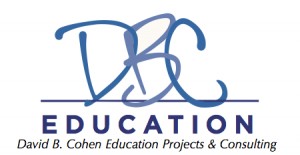Originally posted at my EdWeek Teacher blog, Capturing the Spark, (6/12/16). Happy Father’s Day to all who are celebrating!
Not even two weeks past the end of the prior school year, I’m giving plenty of thought to next year. One particular change on my mind is that my oldest child will now be the same age as my students. It’s been 15 years in the making, this convergence in my life, with sophomores in my classroom and a sophomore at home. As a result, I’ve been thinking about what I’ve learned as a teacher that helps me as the parent of teenagers, and what I’ve learned as a parent that has helped me teach.

My former student, Annie, works for the education non-profit 826LA. Knowing former students in their adult years helps me imagine many paths for my own children.
My teaching experience has helped me take the long view with my children. I started teaching in the mid-1990s, and have had the pleasure of keeping in touch with former students now well into their adulthood, into careers (including teaching) and parenthood. I’ve developed some sense of how many different paths there are, and I’m comfortable with the uncertainty and ambiguity at this point, confident that young people tend to find their way, with or without parental help, or approval. I’ve seen many former students go directly to college and then graduate schools or work, what many of us consider the typical or expected route. Some former students have gone in different directions, following their own vision and ambition to other productive and rewarding experiences. Some of these young adults get lost for a while, some deal with illnesses and addictions. Don’t get me wrong: there are reasons to be scared. There are also reasons to be excited. And there’s no way of being certain what’s coming. I’m going to continue giving advice and support, sharing my values and expectations, but I’m under no illusion that I can choose a path for my children, solve their problems, or protect them from the world.
My teaching experience has also helped me put my children in charge of their education as much as possible. When they need to work something out with their teachers, I expect them to handle it without me. As a teacher, I enjoy meeting with parents in most cases, but at the same time, I try to avoid it. The reason is that when parents are involved in a meeting, the student’s sense of self-determination and accountability will always be compromised. When parents ask to meet with me about school work, I generally respond by suggesting a student-teacher meeting first, unless there’s some special circumstances or unique background information that requires parental input and involvement. (Keep in mind, this is high school). If my meeting with a student doesn’t lead to a viable plan or otherwise satisfactory conclusions, we’ll involve the parents. Usually, the meeting with the student is sufficient. So, as a parent, I’ve never asked for a meeting with a teacher or counselor, though I’ve asked my children to seek extra support when necessary, without involving me directly. Of course, if my children’s teachers or counselors request a parent meeting, I’m there.
My parenting experience has also helped me understand and respect the challenges of time management and divided attention that families deal with. I still think there are many overextended, overscheduled children and families, and I think that many of them are fooling themselves if they think it’s possible to do everything they want, do it well, sustainably, and not feel the negative effects in the near or long term. In my family, we have a quite limited number of extracurricular and family activities that we prioritize, and we still run into scheduling conflicts. Our family calendar looks like a mosaic. Our email inboxes fill up with messages from teachers, schools, the school district, parent organizations, other groups and activities. True confession: I don’t even read all the emails! Shocking, I’m sure. So, I realize now that even when the overall time commitments are reasonable, the potential for confusion and overload is there. Need an extension on that assignment? How long? As long as it doesn’t affect other people’s work, and as long as it’s requested before the due date, I’ll generally say yes. And if students are going to miss a few days of school to go to a family event or spend time with relatives who came to visit, fine. I’ll help them figure out how to make up work that’s necessary, and even let the little things slide.
My parenting experience has helped me respect that children and teens are always becoming, always a work in progress. When they arrive in your classroom with their particular strengths and weaknesses, there’s a backstory you don’t know. What appears to be a deficit may be an emerging strength. This year’s minor problems may have been prior years’ huge struggles. What you see as the results of good or bad parenting are often a matter of individuality and even luck, as children from the same family vary significantly. And sometimes, failure is part of becoming who they are. Failure is part of life, and the opportunity to learn from failure may be a gift more vital than any particular lesson plans or assessments. We shouldn’t set kids up for failure, but we shouldn’t move heaven and earth to spare them from the consequences of (non-dangerous) failures.
I’m sure many readers of this blog are also familiar with the dual roles of parenting and teaching. What have you learned? Leave a comment and share your insights.
